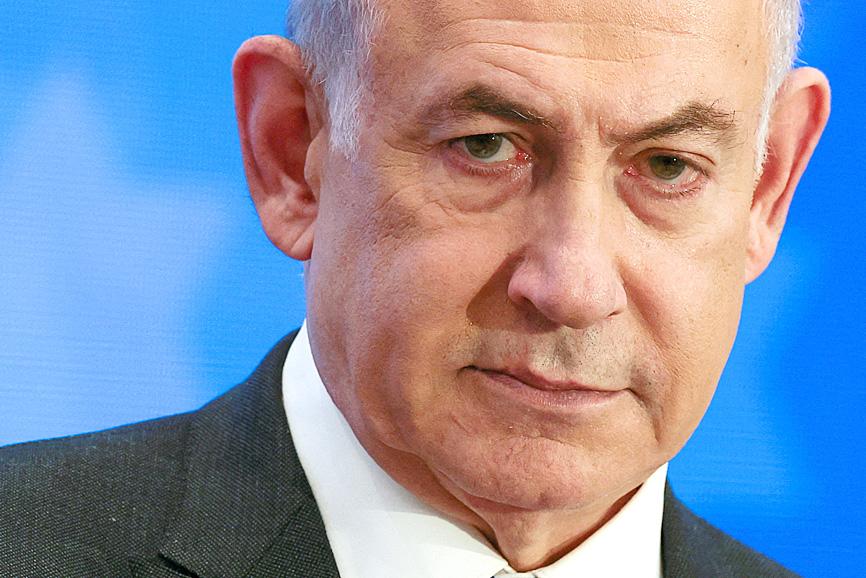Israel considered carrying out a strike on Iran in retaliation for last weekend’s attack, but aborted the plan, Israeli and US media reported.
Iran launched more than 300 drones and missiles against Israel over the weekend in an attack that caused little damage after most of the projectiles were intercepted.
Israeli Prime Minister Benjamin Netanyahu has vowed to respond to the attack, prompting global powers to call for restraint to avoid any further escalation.

Photo: Reuters
Israeli public broadcaster Kan reported that following discussions with US President Joe Biden, Netanyahu decided not to proceed with pre-arranged plans for retaliatory strikes on Iran in the event of an attack.
“Diplomatic sensitivities came into play,” a senior Israeli official speaking on condition of anonymity told Kan, adding that there would be a response, but that it would be different from what was initially planned.
“Israel prepared for and then aborted retaliatory strikes against Iran on at least two nights this past week,” ABC News reported, citing three unnamed Israeli sources.
Among the range of possible reactions considered by the Israeli war Cabinet were options to attack Iranian proxies elsewhere in the region or to conduct a cyberattack, the sources told ABC.
At a Cabinet meeting on Monday, Israeli officials considered giving the Israel Defense Forces permission for a strike against Iran, but “for operational reasons” decided not to go ahead with it, two unnamed Israeli officials told US news firm Axios.
In New York, Iran’s top diplomat on Wednesday said that his country has told the US it is not seeking escalation.
Iran has “tried to tell the United States clearly” that Iran is “not looking for the expansion of tension in the region,” Iranian Minister of Foreign Affairs Hossein Amir-Abdollahian, who is in New York to attend a UN Security Council meeting, said in a video posted by his ministry.

Taiwan is gearing up to celebrate the New Year at events across the country, headlined by the annual countdown and Taipei 101 fireworks display at midnight. Many of the events are to be livesteamed online. See below for lineups and links: Taipei Taipei’s New Year’s Party 2026 is to begin at 7pm and run until 1am, with the theme “Sailing to the Future.” South Korean girl group KARA is headlining the concert at Taipei City Hall Plaza, with additional performances by Amber An (安心亞), Nick Chou (周湯豪), hip-hop trio Nine One One (玖壹壹), Bii (畢書盡), girl group Genblue (幻藍小熊) and more. The festivities are to

Auckland rang in 2026 with a downtown fireworks display launched from New Zealand’s tallest structure, Sky Tower, making it the first major city to greet the new year at a celebration dampened by rain, while crowds in Taipei braved the elements to watch Taipei 101’s display. South Pacific countries are the first to bid farewell to 2025. Clocks struck midnight in Auckland, with a population of 1.7 million, 18 hours before the famous ball was to drop in New York’s Times Square. The five-minute display involved 3,500 fireworks launched from the 240m Sky Tower. Smaller community events were canceled across New Zealand’s

‘IRRESPONSIBLE’: Beijing’s constant disruption of the ‘status quo’ in the Taiwan Strait has damaged peace, stability and security in the Indo-Pacific region, MOFA said The Presidential Office yesterday condemned China’s launch of another military drill around Taiwan, saying such actions are a “unilateral provocation” that destabilizes regional peace and stability. China should immediately stop the irresponsible and provocative actions, Presidential Office spokeswoman Karen Kuo (郭雅慧) said, after the Chinese People’s Liberation Army (PLA) yesterday announced the start of a new round of joint exercises around Taiwan by the army, navy and air force, which it said were approaching “from different directions.” Code-named “Justice Mission 2025,” the exercises would be conducted in the Taiwan Strait and in areas north, southwest, southeast and east of Taiwan

UNDER WAY: The contract for advanced sensor systems would be fulfilled in Florida, and is expected to be completed by June 2031, the Pentagon said Lockheed Martin has been given a contract involving foreign military sales to Taiwan to meet what Washington calls “an urgent operational need” of Taiwan’s air force, the Pentagon said on Wednesday. The contract has a ceiling value of US$328.5 million, with US$157.3 million in foreign military sales funds obligated at the time of award, the Pentagon said in a statement. “This contract provides for the procurement and delivery of 55 Infrared Search and Track Legion Enhanced Sensor Pods, processors, pod containers and processor containers required to meet the urgent operational need of the Taiwan air force,” it said. The contract’s work would be